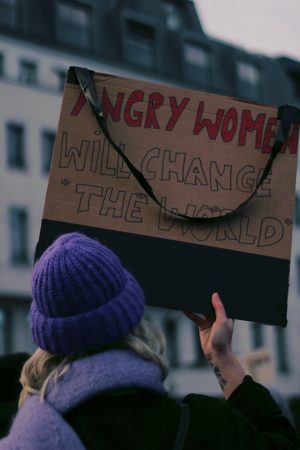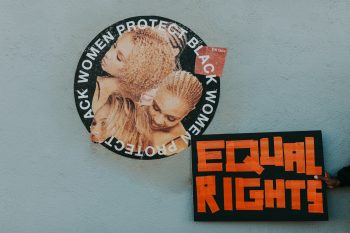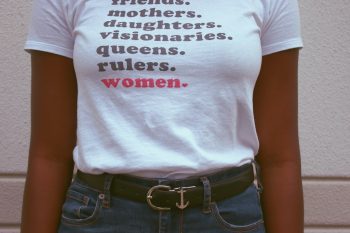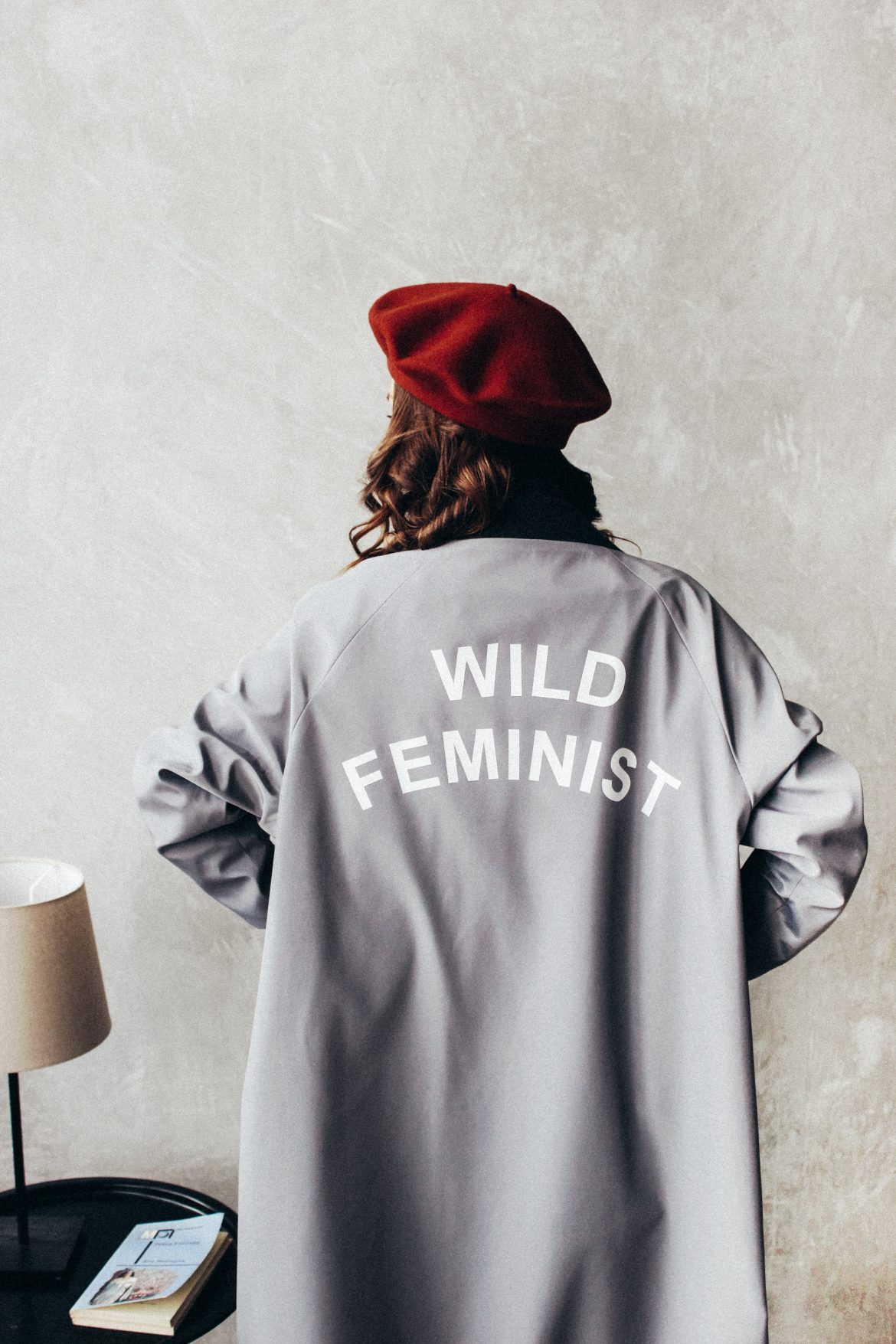To celebrate Women’s Month, we take a walk down feminist memory lane and remember the women who gave us our future.
In December 2021, Sonequa Martin-Green appeared on American talk show The View to chat about her run in the series Star Trek: Discovery.
Sonequa had just become the very first black female to captain a starship in the historic Star Trek franchise, which has been going since 1966. Part of the Star Trek history is Whoopi Goldberg, who played the character Guinan between 1988 and 2002.
Now a host on The View, Whoopi and Sonequa shared a special moment when Sonequa came onto the show. She turns to Whoopi and says:
“Making history in this way, and being cemented in history in this way…this is not my accomplishment, it’s the accomplishment of those that have come before me. I simply stepped onto the path that was already laid for me. And so, I am your accomplishment. And I thank you.”
This touching moment got me thinking about all the women who came before us. The women whose actions changed the course of our future, the women who made all that we accomplish today possible. Since it is Women’s Month, it is the perfect time to reflect on the feminist movement that fought hard for the world we have today. It may not be a perfect world, but it has been passed down progressively better than what it once was.
The birth of feminism
The first documented use of the word dates back to 1837, when a Frenchman used ‘feminisme’ to describe women’s liberation in a utopian future.
Today it is more than just a utopian fantasy. The United Nations (UN) Women describes feminism as “a movement advocating for women’s social, political, legal and economic rights equal to those of men”.

Pexels
However, feminism has a habit of being misunderstood.
The key word in this description is ‘equal’. Feminism does not intend for women to be above men, nor does it fight for women to be the same as men.
Feminism has always been about reaching equal rights and opportunities for all genders. But since the female has for most of, if not all of, history been considered the lesser sex, feminism is primarily focused on ensuring that girls and women are respected and empowered so that we too may have a voice in the world that we occupy.
In recent times, ‘intersectionality’ or the phrase ‘intersectional feminism’ has come into discussion. This is due to the much-needed acknowledgment that not all female experiences (and indeed, people in general) face the same barriers.
The International Women’s Development Agency writes that intersectional feminism reveals ‘the interplay between gender and other forms of discrimination, such as race, age, class, socio-economic status, physical or mental ability, gender or sexual identity, religion, or ethnicity’.

Pexels
A timeline of the women’s liberation
1848
The first women’s rights convention occurs in New York, organised by American noblewomen Elizabeth Cady Stanton and Lucretia Mott. A movement is born through the suffragettes: Women of the late 19th and early 20th centuries who sought their right to vote through marches, protests and lectures. They create a Declaration of Sentiments and Resolutions demanding civil, social, political and religious rights.
1851
Former slave Sojourner Truth delivers her speech entitled ‘Ain’t I A Woman?’ At the Women’s Rights Convention in Akron, Ohio. It is now recognised as one of the most powerful speeches in American abolitionist and women’s rights history.
Kerry Washington recites:
xxx
1893
New Zealand became the first nation in modern history to give women the right to vote. This comes twenty years after a 270-metre long suffrage petition, containing 32 000 signatures, was delivered to parliament.
1911
In commemoration of the suffrage movement that began in 1848, the first International Women’s Day is celebrated across Europe and the United States. More importantly though, this day was used as a way to bring many female voices together.
In 1911, women demanded the right to work and hold public office, and they fought to bring an end to workplace discrimination. While today International Women’s Day is largely for celebration, it has historically been a mechanism for women’s voices to be heard on issues of women’s rights, equality in the workplace, even war and the overthrowing of tyrannical leaders.
1918
The Bantu Women’s League is formed in South Africa by Dr Charlotte Maxeke. A social and political activist, she was the first black woman to graduate with a university degree in South Africa, and the first black African woman to graduate from
an American university.
The Bantu Women’s League is South Africa’s first formal women’s organisation, which later became part of the ANC Women’s League. The women largely fought against the oppressive pass laws enforced on black men and women, designed to segregate the population, manage urbanisation and uphold apartheid.
1930
South African women are given the right to vote, although like most countries during colonial rule this did not include women of colour. The 1933 elections resulted in the first female Member of South African Parliament – Leila Agnes Buissinné Wright – but, there‘s a dark side. Giving white women the vote doubled the number of white voters, diluting non-white South Africans’ rights in choosing their country’s governing body.
1939 –1945
During the Second World War, women across the globe are driven to take on jobs not usually deemed suitable for them. A new cultural icon is born from women war workers, Rosie the Riveter – an image reinterpreted today as a global symbol of women empowerment.
She was used to campaign the patriotic need for women to enter the workforce, especially for defence industries. Although researchers for the History Channel have reported that by the end of the war nearly one in four married women in America worked outside the home, ‘Female workers rarely earned more than 50 per cent of male wages.’
1946
Following the formation of the United Nations, the Commission on the Status of Women is created. It is the first functional intergovernmental body exclusively dedicated to promoting the empowerment of women and gender equality.
1948
The Universal Declaration of Human Rights is released, and for the first time in history basic rights and fundamental freedoms are written for all human beings – men and women alike.
1955
In Montgomery, Alabama Rosa Parks refuses to give up her bus seat for a white man. Segregation laws at the time forced citizens of colour to sit at the back of the bus and leave the front open for white citizens. For refusing to comply with these rules, she was arrested and placed in police custody. On the day of her trial, four days after her arrest, the great Montgomery Bus Boycott by the black community begins. A year later the boycott ends when the Supreme Court rules that bus segregation is unconstitutional.
1956
Holding thousands of signatures petitioning against the oppressive pass laws of South Africa, Lilian Ngoyi knocks on Prime Minister Strijdom’s door at the Union Buildings in Pretoria. The anti-apartheid activist, politician and President of the ANC Women’s League is known today as the ‘mother of the black resistance’.
She was joined by Helen Joseph, Rahima Moosa, Sophia Theresa Williams- de Bruyn and thousands of South African women who had travelled from all over the country to take part. This was the Women’s March that brought women of all races and classes together to protest an unjust apartheid system. Commemorated today as South Africa’s own Women’s Day, it is
still regarded one of the largest and most successful demonstrations in our history.

Pexels
1963
The Feminine Mystique by American writer and activist Betty Friedan is published. In it, Betty notes ‘the problem that has no name’: the systemic sexism which, in the 1950s, taught women their place was in the home and their only fulfilment was found through housework, marriage and children. The book reinvigorated the feminist movement.
“We can no longer ignore that voice within women that says: ‘I want something more than my husband and my children and my home,’” writes Betty. Many did not enjoy the housewife revolution. Quickly the image of feminists as irrationally angry and unhappy, man-hating women grew.
1975
The UN declares the next 10 years as the ‘Decade for Women’.
Between 1975 and 1985, UN Women focused on policies and issues around pay equity, gender-based violence, land holding and basic human rights and freedoms for women. This culminates at the end of the 20th century with numerous landmark treaties and norm-setting outcomes that have transformed women’s lives.
1993
The UN adopt the ‘Declaration on the Elimination of Violence Against Women’. It is significant as the first international instrument to address and define violence against women as a global issue not subject to culture.
2006
Ellen Johnson Sirleaf becomes Africa’s first female head of state when she wins the Liberian elections and is made the 24th President of Liberia. She stood two terms in office and was presented with a Nobel Peace Prize in 2011.
2012
At a TEDxEuston event, Nigerian author Chimamanda Ngozi Adichie reads her essay ‘We Should All Be Feminists’. It becomes the feminist creed for a new age. Calling for the reclamation of feminism, she ends her essay with:
“A feminist is a man or a woman who says, ‘Yes, there’s a problem with gender as it is today, and we must fix it. We must do better’.” Chimamanda’s take on feminism for the 21st century was so popular that the essay was published as a short book in 2014.
2017
The largest single-day protest in US history takes place the day after Donald Trump is inaugurated as the 45th US President. The protests were held worldwide, known as the 2017 Women’s March, with the goal of protecting women’s rights, safety and health while recognising that vibrant and diverse communities are a strength, not a threat.
2018
In response to the gross sexual misconduct exercised by producer Harvey Weinstein, Hollywood celebrities founded the non-profit group Time’s Up. The organisation has set-up the fundraiser Time’s Up Legal Defense Fund to provide monetary support to victims, and works on multiple projects to increase female visibility and voices in the film industry.
2019
It is the year Eyewitness News reporter Thando Kubheka has dubbed “the year South African women demanded to
be heard”. Across the country women joined together in protest marches and social media campaigns to demand an end to the horrifically high numbers of gender- based violence that were experienced throughout South Africa. It continues to be our biggest fight in equality today.
ALSO SEE:
Feature Image: Pexels

